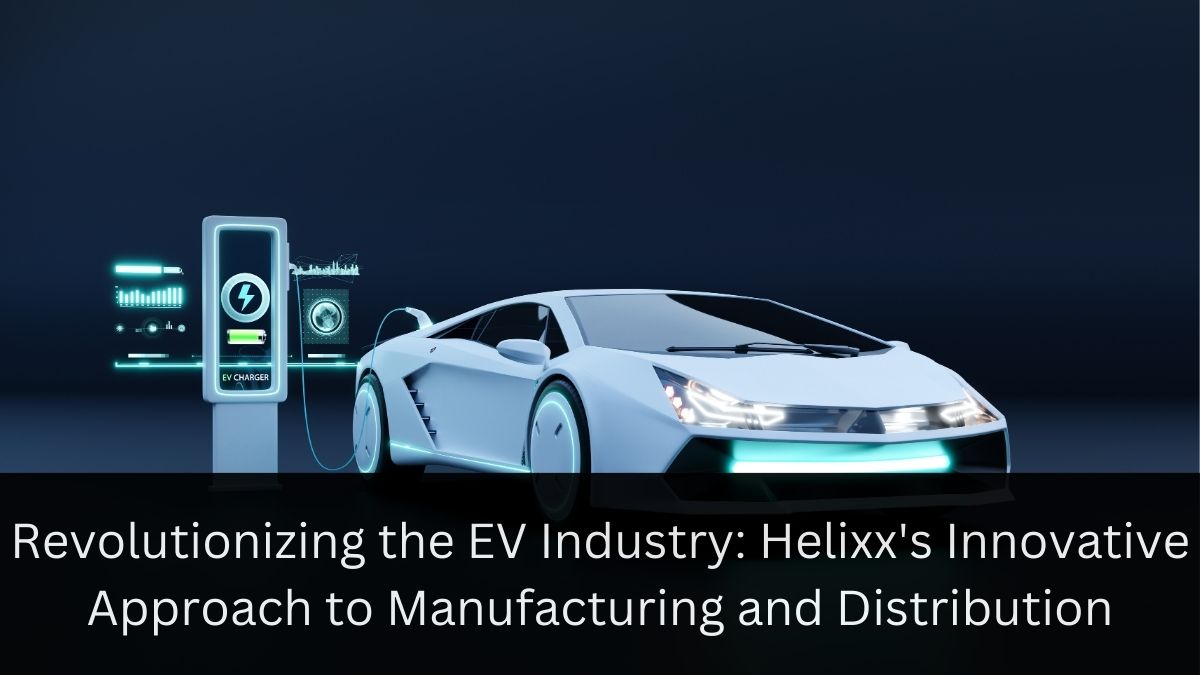Press Release
Revolutionizing the EV Industry: Helixx’s Innovative Approach to Manufacturing and Distribution

In the ever-evolving landscape of electric vehicles (EVs), a new player has emerged with a groundbreaking concept that could reshape the industry as we know it. Helixx, a startup co-founded by Steve Pegg, is bringing a fresh perspective to EV manufacturing and distribution, drawing inspiration from unlikely sources such as fast-food economics and streaming service pricing models.
The Birth of a Revolutionary Idea
Steve Pegg, a veteran of the automotive logistics industry with 25 years of experience, including a stint as product line director at Arrival, has set out to redefine the EV manufacturing process. His brainchild, Helixx, aims to produce hundreds of thousands of affordable electric delivery vans in pop-up factories located near some of the world’s most densely populated urban centers.
At the heart of Helixx’s concept is Daisy, a 3D-printed prototype delivery van that made its global debut at the prestigious Goodwood Festival of Speed. While Daisy’s boxy appearance and 3D-printed components may raise eyebrows, it’s the underlying manufacturing and business model that truly sets Helixx apart.
The McDonald’s of EV Manufacturing
Pegg’s vision for Helixx draws heavy inspiration from the McDonald’s franchise model. He explains, “The principle is very similar to a McDonald’s franchise. You don’t need to be a chef to know how to build burgers, and McDonald’s doesn’t teach you how to be a chef. They teach you how to follow a process.”
This approach allows Helixx to rapidly set up factories and train workers with minimal specialized knowledge. The goal is to create a system where pop-up factories can go from greenfield to producing cars in as little as 180 days.
A Multi-Tiered Revenue Model
Helixx’s business model is as innovative as its manufacturing process. The company has developed a multi-tiered revenue system that goes beyond simply selling vehicles:
- Licensing Fee: Partners pay around $50 million to access Helixx’s complete platform, covering everything from component sourcing to fleet management.
- Component Sales: Helixx manages the supply chain logistics, selling components to fill the factories.
- Service Fees: A monthly fee of approximately $80 per vehicle produced.
- Royalties: $500 for every vehicle put into service.
- Data Monetization: Tracking and selling usage data from vehicles for city planning and fleet logistics purposes.
Targeting Emerging Markets
Helixx has set its sights on emerging markets where traditional three-wheeled vehicles, like tuk-tuks, dominate the streets. Cities such as Jakarta and Bangkok present prime opportunities for Helixx’s electric vans to make a significant impact on both transportation and air quality.
The Daisy: A Simple yet Effective Solution
The Helixx Cargo, affectionately known as Daisy, is designed with simplicity and affordability in mind. Key features include:
- All-electric powertrain
- Swappable LFP battery modules (25 pounds each, 2 kWh capacity)
- Maximum speed of 55 mph
- Weight under 1,200 pounds
- Minimal features to keep costs low
A Netflix-Inspired Subscription Model
In a novel approach to vehicle access, Helixx plans to offer its vans through a subscription model reminiscent of streaming services like Netflix. Subscribers will pay a monthly fee for access to a vehicle for a set number of hours or days per month, regardless of actual usage.
This subscription model aims to provide a steady revenue stream for Helixx and its franchisees, avoiding the demand-based fluctuations that often plague other mobility services.
Scalability and Production Goals
Helixx’s ambitions are nothing short of remarkable. The company is targeting partners capable of building factories that can produce at least 100,000 cars per year in a space of roughly 50,000 square feet. While this may seem ambitious, the simplicity of Daisy’s design and the innovative manufacturing process make it a potentially achievable goal.
The Future of Helixx
As Helixx embarks on its $20 million Series A fundraising round, the company is actively seeking partnerships with major automotive manufacturers. By targeting the corporate venture capital arms of companies like Toyota and Hyundai, Helixx hopes to leverage existing expertise while opening up new markets for these established players.
The $6,000 Daisy van is just the beginning. Pegg envisions a future where franchisees can simply download designs for new vehicles and immediately begin production in their modular factories, expanding Helixx’s reach and impact on the EV industry.
Helixx’s innovative approach to EV manufacturing and distribution has the potential to disrupt the automotive industry in profound ways. By combining fast-food economics, Netflix-style pricing, and cutting-edge manufacturing techniques, the company is positioning itself to bring affordable, eco-friendly transportation to emerging markets around the world.
As the EV industry continues to evolve, all eyes will be on Helixx to see if its ambitious vision can become a reality. If successful, we may be witnessing the birth of a new paradigm in automotive manufacturing and distribution that could reshape urban transportation for decades to come.
